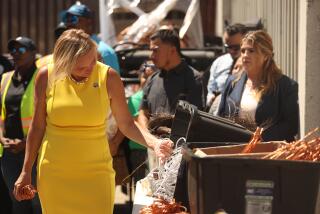DWP Leaders’ Spending During Strike Assailed as Extravagant : Finances: City Council orders inquiries into more than $7.7 million spent by officials during the walkout.
In a blistering attack, Los Angeles City Council members Tuesday accused the Department of Water and Power’s top brass of arrogance and extravagance during last month’s utility strike and suggested that the DWP may now have trouble winning the 4.75% power rate increase it is seeking.
In the first faceoff with the department since allegations of excessive strike-related costs arose last week, the council unanimously approved audits of the more than $7.7 million in costs stemming from the walkout. It also voted to hire an outside inspector general to analyze costs.
Most of strike tab went for $6.2 million in overtime--a figure the council learned for the first time Tuesday.
With DWP General Manager Daniel Waters seated before them, council members issued harsh rebukes, accusing him of spending too much on the strike and then misleading the council about the price tag for food and other items.
“Your credibility, the department’s credibility, is zero,” Councilwoman Rita Walters said.
To dramatize the high food tab--which at nearly $800,000 has been at the center of the storm--Councilwoman Laura Chick distributed muffins and pie she had purchased at a bulk warehouse at a fraction of the prices the DWP paid for baked goods.
“We have a beer budget and I think the DWP clearly has champagne tastes,” said Chick, adding that her office has been barraged with telephone calls critical of the DWP in recent days.
Councilman Zev Yaroslavsky questioned the price paid to videotape picket lines--a tab that rose to $311,580, according to the latest DWP figures. Yaroslavsky, after receiving a letter from a professional videotaping service that questioned the price, called for a detailed accounting of the videotaping, which the DWP said it began at the Los Angeles Police Department’s recommendation to cut down on violence on the picket lines.
Council members accused Waters of repeatedly misleading them about the net cost of the strike, which began Sept. 1 when about 10,000 members of the International Brotherhood of Electrical Workers Local 18 and the Engineers & Architects Assn. walked off their jobs.
During the nine-day walkout, council members said, Waters argued for a quick settlement by stressing the extreme costs to the city.
But on Tuesday, Waters presented the council with a report that seemed to suggest that the city saved money on the strike. The report said the amount saved by not paying striking workers (more than $9 million) exceeded the total strike costs (about $7.7 million).
In an interview after the meeting, however, Waters said the report did not tell the whole story. He acknowledged that the strike will cost the city money in the end--although he did not specify the amount. He said he did not include in his calculations for the council the cost of running city power facilities at inefficient levels during the strike.
Waters, the DWP department head since 1990, acknowledged that the strike costs were far higher than during a normal work period, but he said the walkout was an extraordinary situation. An internal DWP committee has been set up to review the department’s actions, he said.
“We did make mistakes--no question about it,” he said. “We could have done things differently if we had been in a normal situation.”
In interviews, several council members said the flap over strike costs could endanger passage of the DWP’s 4.75% rate hike request. “I’ll never vote for it,” Councilman Hal Bernson said.
The department had scheduled public hearings on the rate increase, but those hearings were canceled because they fell during the walkout. No other hearings have been scheduled, Waters said, and the department is reviewing its request.
More to Read
Sign up for Essential California
The most important California stories and recommendations in your inbox every morning.
You may occasionally receive promotional content from the Los Angeles Times.










